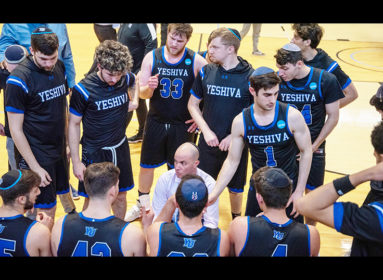
This week, the Jewish Federation of Eastern Connecticut (JFEC) raised the curtain on the 23rd Annual International Film Festival of Eastern Connecticut. The Festival will run through Sunday, June 18 and is presented in association with The Garde Arts Center (New London), Mystic Luxury Cinemas (Mystic), B.P. Learned Mission (New London), Connecticut College Hillel (New London) and Temple Bnai Israel (Willimantic).
The Festival opened on May 24 with an opening night screening of the film “On the Map.” The remainder of the Festival will run June 4 – 18. Admission to each film is $10.
For a ticket and other information contact the Jewish Federation at (860) 442-8062, or visit jfec.com.
SUNDAY, JUNE 4, 3 p.m.
“Denial”
(U.K., 2016, 110 minutes)
The Garde Arts Center
Based on the acclaimed book Denial: Holocaust History on Trial, this film recounts historian Deborah E. Lipstadt’s legal battle for historical truth against David Irving who accused her of libel when she declared him a Holocaust denier.
Wine, cheese & dessert reception immediately following the film.
WEDNESDAY, JUNE 7, 7 p.m.
“The Wedding Plan”
(Israel, 2017, 110 minutes)
Mystic Luxury Cinemas
At 32, Michal is finally looking forward to the comfort and security of marriage, when she is blindsided by her fiancé’s decision to call off the wedding with only a month’s notice. Unwilling to return to lonely single life, Michal decides to put her trust in fate and continue with her wedding plans, believing Mr. Right will appear by her chosen date.
THURSDAY, JUNE 8, 7 p.m.
“Who’s Gonna Love Me Now?”
(Israel/U.K., 2016, 84 minutes)
B.P. Learned Center (New London)
It was 18 years ago when Saar, a young Jew raised in a religious family, had to leave the kibbutz because of his homosexual orientation. He moved to London where he could finally live the life he wanted. When it turns out that he was HIV positive, he and his family have to face yet another challenge.
“El Yehudia” (short film)
(Israel, 2016, 13 minutes)
B.P. Learned Center (New London)
A short film made last year by three friends in their senior year in high school. 2016 winner of the Haifa Film Festival, Young Film Competition.
SUNDAY, JUNE 11, 7 p.m.
“The Pickle Recipe”
(U.S., 2016, 97 minutes)
Olin Science Center, Connecticut College
Joey Miller is the king of Detroit party emcees. He’s also a single father and deeply in debt. After his equipment is destroyed in a freak accident, right before his daughter expects him to emcee at her bat mitzvah party, he turns to his shady Uncle Morty, who agrees to give him the money he needs to get back into business — if Joey agrees to steal his grandmother Rose’s top-secret dill pickle recipe. Deli dinner ($18) at 6 p.m., prior to movie.
“The Last Blintz” (short film)
(U.S., 2015, 29 minutes)
Olin Science Center, Connecticut College
The closing of the Cafe Edison (aka the Polish Tea Room) is not just a story about another famous show business haunt shutting its doors – it’s about the American dream coming to a tragic and premature end.
 “Secrets of War”
“Secrets of War”
(Netherlands/Belgium, 2014, 96 minutes)
Temple Bnai Israel (Willimantic)
Summer 1943. Tuur and Lambert are best friends living in an idyllic village. But the war is closing in and is about to change their lives forever. A bittersweet ode to innocence lost, “Secrets of War” is adapted from the best-selling young adult novel by Jacques Vriens. Note: Recommended for ages 10 and older.
“Joe’s Violin” (short film)
(U.S., 2016, 24 minutes)
Temple Bnai Israel (Willimantic)
In this short documentary film Joe’s Violin – which was nominated for a 2017 Academy Award – a donated musical instrument forges an improbable friendship between 91-year-old Holocaust survivor Joe Feingold and 12-year-old Bronx school girl Brianna Perez.
MONDAY, JUNE 12, 7 p.m.
“The Impossible Spy”
(U.S., 2016, 91 minutes)
Olin Science Center, Connecticut College
Filmmaker Harvey Chertok will introduce the film at the festival and be on hand for a Q&A following the screening.
WEDNESDAY, JUNE 14, 7 p.m.
ENCORE PRESENTATION!
“Secrets of War” and “Joe’s Violin”
Olin Science Center, Connecticut College (see above for details)
THURSDAY, JUNE 15, 7 p.m.
 “The People vs Fritz Bauer”
“The People vs Fritz Bauer”
(Germany, 2016, 105 minutes)
Olin Science Center, Connecticut College
Germany, 1957. Attorney General Fritz Bauer receives evidence that SS-Obersturmbannführer Lt. Col. Adolf Eichmann, responsible for the mass deportation of the Jews, is hiding in Buenos Aires. Distrustful of the German justice system, Bauer contacts the Israeli secret service, Mossad, and, by doing so, commits treason.
SUNDAY, JUNE 18, 7 p.m.
“The Women’s Balcony”
(Israel, 2016, 96 minutes)
Olin Science Center, Connecticut College
Reception immediately following film.
“The Women’s Balcony” is a surprise hit overseas
By Gabe Friedman
 (JTA) – It’s safe to call the Israeli film “The Women’s Balcony” the opposite of a Hollywood blockbuster.
(JTA) – It’s safe to call the Israeli film “The Women’s Balcony” the opposite of a Hollywood blockbuster.
The movie, directed by Emil Ben-Shimon, is a sensitive, slice-of-life story that focuses on the rift caused in a modern Orthodox community in Jerusalem when a Hasidic rabbi offers to fill in for the congregation’s leader, who is traumatized when his wife is hurt in an accident. When the new rabbi urges the men in the congregation to embrace a more strictly religious lifestyle, they buy in and ask their wives to dress more modestly and adhere more closely to the words of the Torah.
But the men’s wives rebel after initially being conflicted by the changes.
The production is unassuming: There is no fancy camerawork, no huge twist, no laugh-out-loud moments, no sex and no violence (although there is some yelling – it is, after all, a movie about Israelis).
Yet the movie is a breakout hit in its native country and is succeeding overseas. In Israel, it sold more tickets than any other Hebrew-language film last fall and into this year.
The film, which has enjoyed a wide release and positive reviews in Spain, will be distributed to theaters in Turkey and across Latin America. Based on its performance in a pre-release in two small U.S. markets – the film’s distributor, Menemsha Films, expects “The Women’s Balcony” to rake in well over $1 million in box office sales here once it is released in New York City on May 26. After New York, the film will be shown in the top 25 other markets across the country.
Its success in Israel – where there’s a public debate about how much influence the stringently Orthodox Chief Rabbinate should have over myriad aspects of life – is a bit of a no-brainer. But its international success has less obvious roots.
“The Women’s Balcony” is a religious, feminist parable – albeit a nuanced one. The story is set in motion when the women’s balcony of the synagogue – an elevated section where the women sit at services, separating them from the men – collapses during a bar mitzvah ceremony. The men of the congregation, entranced by the Hasidic rabbi’s passionate sermons, initially acquiesce to his wishes to use the money raised to fix the damage to buy a new (and presumably holier) Torah scroll. The rabbi also arranges for the building of a more separate and restrictive women’s section – an enclosed box where the balcony used to be.
The women in the film don’t take the new rabbi’s meddling lightly. In order to get the kind of women’s section they want, some threaten to leave their husbands.
The story is inspired by first-time screenwriter Shlomit Nehama’s Orthodox childhood in Jerusalem. She is no longer religious, but respects the concept of a women’s balcony.
“I see the concept of a women’s balcony as a very charming thing,” Nehama said. “The women looking at the men from above the heads of the men. Like in the gallery of a very respected theater.”
Perhaps that gentle attitude toward the traditions of a religious community – rather than dogma from the right or left side – speaks to the film’s unlikely success outside of Israel’s modern Orthodox community.
Jerusalem Post movie critic Hannah Brown found the story to be a “throwback to a kinder, gentler time, when communities were closer.”
“When there is an event to be celebrated – a bar mitzvah, a holiday or a wedding – the entire group heads out to the synagogue, located in one of Jerusalem’s older neighborhoods. There are none of those garish event halls that people tend to use these days, and the women prepare the food themselves; no one goes into debt paying for huge catered meals.”
Los Angeles Times film critic Kenneth Turan believes that people crave cultural specificity from foreign films.
“It sounds paradoxical, but it’s often true that the more culturally precise a foreign language film is, the more universal its appeal becomes,” he wrote in his March review of the movie.
In the end, the secret to the success of “The Women’s Balcony” may be that the filmmakers don’t attempt to include any outside or political debates about religiosity. The well-crafted result – a confident, true-to-life portrait of a small community in all of its complexity – is a valuable outlier in a world in which religious practice is increasingly polarized.
Film producer to speak about Israel’s number one spy at film fest
By Stacey Dresner
NEW LONDON – Harvey Chertok made a promise to the brother of Israeli spy Eli Cohen that he would share Cohen’s story with as many people as possible for as long as he could.
 And so, in 1987, he produced a film about Cohen – an Egyptian Jew who moved to Israel, joined the Mossad, infiltrated the Syrian government and military, and is remembered today as one of Israel’s most valuable spies and treasured heroes. And for the past 30 years he has been keeping his promise to Cohen’s brother by screening “The Impossible Spy” at Jewish film festivals around the country. The film stars John Shea as Eli Cohen, and Eli Wallach as the head of the Mossad.
And so, in 1987, he produced a film about Cohen – an Egyptian Jew who moved to Israel, joined the Mossad, infiltrated the Syrian government and military, and is remembered today as one of Israel’s most valuable spies and treasured heroes. And for the past 30 years he has been keeping his promise to Cohen’s brother by screening “The Impossible Spy” at Jewish film festivals around the country. The film stars John Shea as Eli Cohen, and Eli Wallach as the head of the Mossad.
On Monday, June 12, 7 p.m., Chertok will introduce “The Impossible Spy” when it is screened at the 23rd Annual International Film Festival of Eastern Connecticut. Chertok will also participate in a post-screening Q&A.
Chertok says he first learned about Eli Cohen when he and his wife, Bobbie, were on a trip to Israel.
“On Aug. 19, 1982, we were on the rooftop of the Hotel Nof in Haifa and the assistant manager of the hotel who took us up there said, ‘Look over there. Do you see that mountain range? That is Lebanon. Look over there. That is Syria. And that is Jordan.’ I said, ‘Oh my God, we are surrounded so closely.’ And he said, ‘Don’t worry. We have very good spies. And the best spy of them all was Eli Cohen.”
The hotel manager suggested that Chertok stop at a bookstore on his way back to Tel Aviv and get Our Man in Damascus, a book about Eli Cohen.
“That was the exact day that I began my obsession to make this movie,” said Chertok, who became fascinated with Cohen’s story.
Eliyahu Ben-Shaul Cohen was born in Alexandria, Egypt in 1924.
As a young man he stayed in Egypt, even when his parents and brothers emigrated to Israel, and finished his studies in electronics and participated in Jewish and Zionist activities. But by 1956 he and many other Jews in Egypt were expelled and he emigrated to Israel. He joined the IDF and married an Iraqi Jew named Nadia.
Cohen was recruited by the Mossad, who thought he was the perfect candidate to infiltrate Syria. He moved to Argentina and took the identity of a Syrian businessman. He moved to Damascus in 1962 and forged close relationships with Syrian politicians and the military.
“He was so successful in infiltrating the Syrian high command, that he was nominated to be the defense minister of Syria,” Chertok explained. “He was third in line to be the president of Syria – that is incredible!”
Cohen had such a close friendship with Syrian officials that he was the only civilian given a tour of Syrian fortifications in the Golan Heights. With his “brilliant, retentive memory,” Chertok says, he memorized the 179 gunning placements and the information helped Israel to capture the Golan Heights quickly during the Six-Day War.
After one last fateful trip to Syria, Cohen was uncovered as a spy. He was hanged in Damascus Square on May 18, 1965. His body was never returned.
Chertok, who worked mostly in the publicity business, had produced a few movies before this, but filming Cohen’s story, he said, was a major challenge.
He had worked with the BBC in London and had some contacts. He approached them about doing a film about Cohen and they were interested.
“This was a little unusual because the British were not too favorable at that time about Israel, but they were so excited about this story. They jumped on it right away.”
Chertok raised the money and a script was written.
Not only did BBC fact-checkers scrupulously read over the script, but several prominent Israelis also checked it out. Among them: Shimon Peres, then-Defense Minister Yitzchak Rabin, Maya Amit, who was then head of Mossad in charge of Cohen’s mission, and Eli Cohen’s widow, Nadia.
When filming finally began, Chertok, said he had a “very unusual role in the making of the movie, and that was to see that there was no publicity at all during this production. We were producing it in Israel in various locations and things could happen. We were doing one shoot a little outside of Tel Aviv and there was a lot of fire fighting and a lot of the local Arab people came over, and asked ‘What’s going on?’ And I just had to brush them off. I said we were just making a commercial.”
Chertok says that even after 30 years, “The Impossible Spy” is still fresh.
Late last year Eli Cohen was back in the news when Syrian rebels allegedly offered to return his body to Israel. They soon backed off of that, but did post a video of Eli Cohen’s hanging on Facebook.
With the upcoming 50th anniversary of the Six-Day War, Cohen is still being remembered by many in Israel as a hero.
“Many people believe if it wasn’t for this one man, there would be no Israel today,” Chertok said. “He is Israel’s National Hero.”








 Southern New England Jewish Ledger
Southern New England Jewish Ledger











